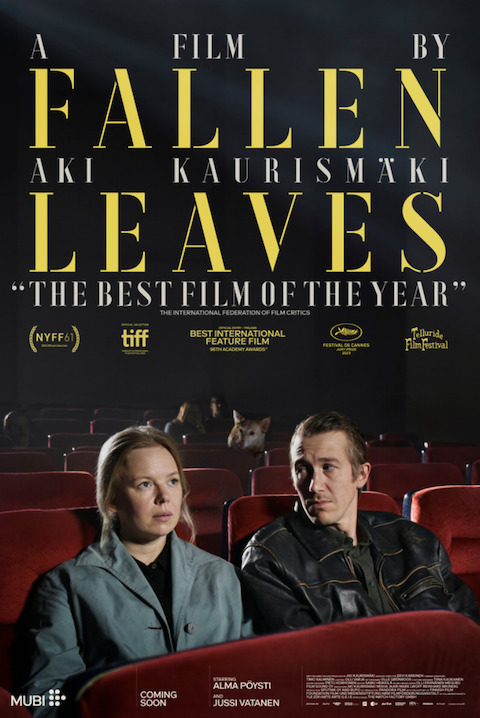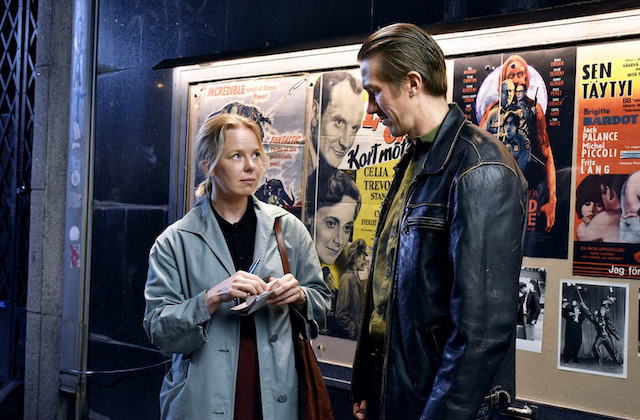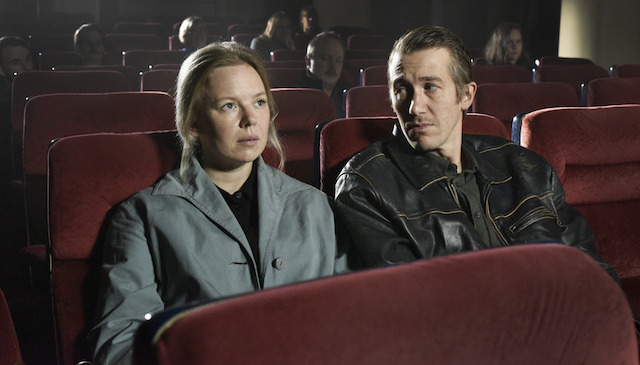
@Courtesy of MUBI
Synopsis : In modern-day Helsinki, two lonely souls in search of love meet by chance in a local karaoke bar. However, the pair’s path to happiness is beset by numerous obstacles — from lost numbers to mistaken addresses, alcoholism, and a charming stray dog.
Genre: Comedy, Drama
Original Language: Finnish
Director: Aki Kaurismäki
Producer: Misha Jaari, Aki Kaurismäki, Marklwoff
Writer: Aki Kaurismäki
Release Date (Theaters): Limited
Box Office (Gross USA): $357.4K
Runtime:
Distributor: MUBI
Production Co: Sputnik Oy
Q&A with Actors Alma Pöysti and Jussi Vatanen
Q: It was a really wonderful surprise to find out that there was going to be a new movie in the world because we were all thinking that he was going to retire. It was a surprise for you too. take us back to that surprise. When did you first hear that you were in consideration for this film? How did that begin for you?
Jussi Vatanen: We both got our different phone calls. It was his producer who asked us if we would like to meet with Aki Kaurismaki and have lunch with him to talk about these upcoming projects. First of all, I thought it was like a prank call or something… He said in an interview, like five or six years ago, that he was not making any more films. It was totally surprising.
Alma Pöysti : I got that same kind of phone call. I went to lunch and there was the legend — he likes it with paint on his hands and being very real. We both grew up watching his movies. He’s an absolute legend in Finland and I visited his bars and he’s been in my life. He’s been very much present, but I never met him before. Then we started to talk about this, the mass of the forest, the cultivation of asparagus, the government and politics. At the end, he presented this idea of the script in a mumbling shy way,
Q: It wasn’t a script at that time.
Alma Pöysti : For me as well, I almost fell off my chair. I did not see that ever… I’m still holding on to these chairs because here we are now in New York, having a premiere of “Fallen Leaves.” It’s really been a dream come true. I never even realized I could dream about it.
Q: You grew up watching his movies and he obviously was a legend all around the world. He refers to this movie as a part of this trilogy about the working class. That was one of the ways that he talked about the movie. Is that something that came about later on, this movie’s relationship with the trilogy.
Jussi Vatanen: I think he mentioned that quite early on. I can’t remember. Am I right?
Alma Pöysti : I know that when he wrote the script, it was cooked in him for a while and then his fingers wrote it in a week — he just let his fingers do it. When he read what he had written, he said it was apparently the force and the lost part of his working class trilogy. He didn’t really plan this to happen. He had this idea of these two characters, that was the germ of it.
Jussi Vatanen: I remember something nice, how he portrayed the film to us that it was like a romantic comedy. There’s one kiss on the cheek, one handshake and a kiss on the forehead.
Q: It has a lot of romantic comedy elements in it but there are a lot of layers. It sounds like a fairy tale but also a tragedy. There are so many layers that are happening in this film. What was the lead in for you into your characters with the layers of comedy and tragedy happening at the same time? How did you tap into the loneliness and the headspace of your respective characters?
Alma Pöysti : It was all in the script. It was such a beautiful crystal clear script. I realized it was also the shortest one ever; he’s a man of few words. But the words, oh boy, they are very well chosen. I realized that I need to learn how to read this as carefully as I could because all the clues to her are there. For example, the way she handles that electrical field. That said everything about this woman. The line that she said when her father died of alcohol — her brother as well — also speaks so much about where she’s coming from and what’s her perception of love and her anticipation of it.
The choice she made is the right one. It was a very painful one but she supposed it was for herself, it hurts and it’s quite a modern way of not being codependent. She’s not going to save this guy because, at that point of the story, she’s already deeply in love with him. Then she still has to somehow refuse him. That was also all in the script. There are these kinds of clues. I realized that there is nothing I needed to add or make up for or compensate. It’s more of just trusting it and taking down as much as I dare to. That’s going to be enough.
 @Courtesy of MUBI
@Courtesy of MUBI
Q: What was it like for you to talk to this character with his loneliness and quietness?
Jussi Vatanen: I think that the most interesting aspect of all of these roles is that he’s this loner and shy guy, but also a tough guy. He says that he’s really of God. When he meets this lady for the first time, something’s happening deep down in his soul or heart that maybe is like an idea that there is something in life that just hasn’t happened to me yet?
He has to make a decision — do I still want to keep my solitary world and alcoholism or do I want to open up? That’s something in which I could relate to and, I guess, anybody could relate to. It’s nice to fall in love, but it’s also terrifying at the same time because these characters are not teenagers. They’re in their 40s and probably have had a lot of misfortune in their lives already. To jump into this, to love her, it takes a lot of courage from these characters.
Jussi Vatanen: I truly found that to be the most interesting part and we absolutely need more romances and rom coms about people in their 40s and older.
Q: Could you both give a little taste of the experience? What is it like to work with him day to day on the set? What is he like as a director? Is he very hands-on or do you do your own thing based on the direction that you have from the script? What were some of the unique things that stood out to you most from that experience?
Alma Pöysti : He’s such an auteur. He writes and directs it. He’s been doing it for 40 years. So he’s there on the set, building the frame, he’s got such a special and visual talent. He’s there moving chairs, paintings, ashtrays and getting it right. As I said, The vision is very clear. He’s very exact, but then he also leaves space for us to bring our hearts and life to the characters. It was a journey into old school filmmaking.
It’s shot on 35 millimeter film. There’s a huge respect for that material. He cuts the film before he shoots it. There is nothing extra done. He told us not to rehearse; somehow knowing our lines, but not really getting too much. He said that he prefers to do the shots in one take, which is a terrifying combination. We came to the center and found out that it was actually true. It was quite a shock at first, but then we started to love it when you get it right because you realize that these moments you get when it’s the first and only time something happens in front of the camera.
Those moments are so precious, honest and pure that you really don’t want to mess it up. He also said that if you mess it up, you take it two times and if it’s a disaster, it’s free. It was a beautiful concentration on the set and this goes for everyone. It’s the light, the camera and everyone needs to get it right for that take. This was pretty unique. Both of us are digital kids, doing multiple takes with cameras and angles. You can go on forever but this was here. You don’t have to dare to fail, you have to dare to succeed in a way.
Jussi Vatanen: It was a fun set to hang out. He has a very lovely sense of humor, lovable God. But he also, I think he’s like a master in casting his films. If you look at all the faces in, in those far scenes that are quite amazing faces, but he also uses a lot of like amateurs even in, in speaking roles. For example, those two guys who are after the film come out from the cinema and we talk about the friends, those, those were obvious neighbors and he was like, it’s very convenient. I get a ride home and it’s just something amazing that somebody has a vision that I want those guys in my field and they can do it and they definitely nailed those lines.
Q: Since you brought up the cinema scene, did you anticipate coming here and seeing Adam Driver playing a zombie. Do you have any idea why that Jim Jarmusch movie was chosen for your character’s date?
Alma Pöysti : Jim and Aki had been talking to each other for years. So there’s that. You have quite an interesting theory about why you want to take an or something.
Jussi Vatanen: He’s hurt.
Q: Tell us about Alma the dog. How did she get to be in the movie? What was it like working with Alma?
Alma Pöysti : Yes. Alma’s a street dog from Portugal who really prefers to talk to people. This is her view and I adore my colleague, Alma. She’s so talented. She’s an absolute natural. She’s got such a sense of rhythm. I guess she threw us all, blew us away, by her very strong artistic choices. You can only get away with that if you’re the director of a dog. But we had a wonderful time getting to know each other and trusting each other. She knew I always had the occasional sausage in my pocket. It was worth it.
Jussi Vatanen: It was terrible that she couldn’t come. We were actually a bit embarrassed that they just threw some dogs at us for the pictures. We were devastated that we couldn’t take this dog — a beautiful dog called Bijou.
 @Courtesy of MUBI
@Courtesy of MUBI
Q: It was really fascinating, the view of the two ladies in the bar singing. Are they a known group? The song they did was so infectious. You could see the audience rapped, just gobsmacked by it. Tell us about them; the song is wonderful and very catchy. Are they popular?
Jussi Vatanen: It is a real band and they are quite big in Finland. Nowadays they are touring in Germany and they were in the Czech Republic just this week. An amazing band. Their name in Finnish and it means the Spice Girls — they are the Depressed Spies.
Q: Throughout the film, there’s this simultaneous duality where recent geopolitics are an undercurrent as well as a timeless, sort of mid century modern 1950s, or ’60s minimalism. Was that dichotomy intentional and was the constant mentioning of Ukraine amongst the set of such mid century minimalism? Let’s look at contrast which, in your view, is intentional. How does it bring you out in the movie?
Alma Pöysti : I would say that everything in this movie is intentional. He creates this kind of fairy tale, mixing all these high layers and he suggests somehow to throw logic out the window. It could happen at any point — you see the interior of the trains are old but the exteriors are new; he’s just playing around or messing with you. The calendar on the wall says it’s 2024. It’s maybe a sci-fi movie.
Of course, then there’s the war that just keeps going on even in 2024 which apparently seems to be heading that way. It would have been impossible for him to make a movie without having the world present. It’s something we in Finland are in shock of — that it’s happening. It resulted in us not being a part of NATO because it’s a very real thing. Our neighbor isn’t going away at any time.
I believe we share a long order. But, going back to what Akin said, it would have been impossible to make a movie without commenting on it because when you make a movie, you make a time capsule of what is happening. Any time in the future when someone watches this movie, they will at least remember this time.
Q: There are scenes without dialogue where you’re just sitting there. How did you feel when you did them, did you feel the duration? Did you know where he wanted you to end those scenes? Were you keeping track of the duration and how did you know that you had to grow out of that silence?
Jussi Vatanen: It was directed all the time, but maybe some shots were longer than others. I think that he gave us some advice. Of course, you have to carry the situation as long as you can until somebody says, “thank you” or “cut.”
Alma Pöysti : It’s something we’re very good at and we didn’t get uncomfortable being silent. It’s something we actually sought together; to share a silence is something very precious where we come from. It can speak volumes, it can be quite loud. We were both familiar with this. We had quite a lot of fun with the silences of actors because there was so much we could explore. How far can you stretch a moment? How awkward can it get? How much can you share in it? Where’s the connection in it? Playing around without words is fascinating and a wonderful thing.
Q: Do you remember some of those moments that you had the most fun? What was most joyful for you to navigate?
Jussi Vatanen: There are a few of them — like actually sitting where they were having dinner and on the couch. It was so much fun. A model of a scene with two shy people getting to know each other, trying to communicate and to find something in common, something together we can share. Of course, the first encounter was also very important. I don’t know how he does it, but he can stretch the moment forever.

